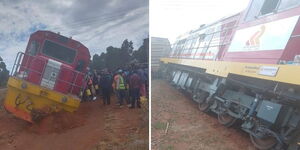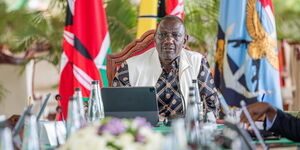Explainer: Everything You Need to Know About Freemasons
On Wednesday, the county government of Nairobi shut down the Grand Lodge of East Africa’s Freemasons’ Hall over alleged land rates arrears mounting up to Ksh19 million, eliciting a heated debate on what freemasonry is all about.
The move by the county opened discussion surrounding Freemasonry, often perceived as secretive, leading to speculation about its activities and influence.
Some Kenyans see it as a fraternal group focused on charity and personal development, while others associate it with mystery, conspiracy theories surrounding devil worshipping and ritualistic practices, and religious concerns.
"I feel like we have been very misinformed a lot about Freemasonry. Just like we have been misinformed about nutrition, education, medicine, religion, and governance. All the things that we were told were bad are not bad, as we have realised. We have always been given the opposite info," a Kenyan told Maina Kageni on Thursday.
In this piece, we look at what Freemasonry is all about. According to its official website, Freemasonry is one of the world's oldest secular fraternal societies, which originated in Scotland.
It is a society of men concerned with moral and spiritual values. Its members are taught its precepts by a series of ritual dramas.
The essential qualification for admission into and continuing membership is a belief in a Supreme Being. Membership is open to men of any race or religion who can fulfil this essential qualification and who are of good reputation.
The organisation, however, has clarified that it is neither a religious organisation nor is it a substitute for such.
"Freemasonry is not a religion, nor is it a substitute for religion. The one essential qualification means that Freemasonry is open to men of many religions, and it expects and encourages them to continue to follow their faith. It is not permitted for Freemasons to discuss religion at Masonic meetings," the organisation explains on its official site.
The organisation is involved in several charity projects. Some charities benefiting from it are hospitals, schools, community centres, the elderly, the terminally ill, and many more needy members of society.
The brotherhood is driven by three major values, which are brotherly love, relief, and truth. Members are graded in four categories, which are life member, patron, grand patron, and Lodge/Chapter Grand Patron.
It has a significant presence across Africa, with numerous lodges operating under different Grand Lodges, including the District Grand Lodge of East Africa, that covers Kenya, Uganda, Tanzania, and Seychelles.
Freemasons' Hall in Johannesburg, South Africa, serves as a key centre for Masonic activities. Sharook Riviera Grand Lodge in Zanzibar, Tanzania, is part of the broader Grand Lodge of Africa.












